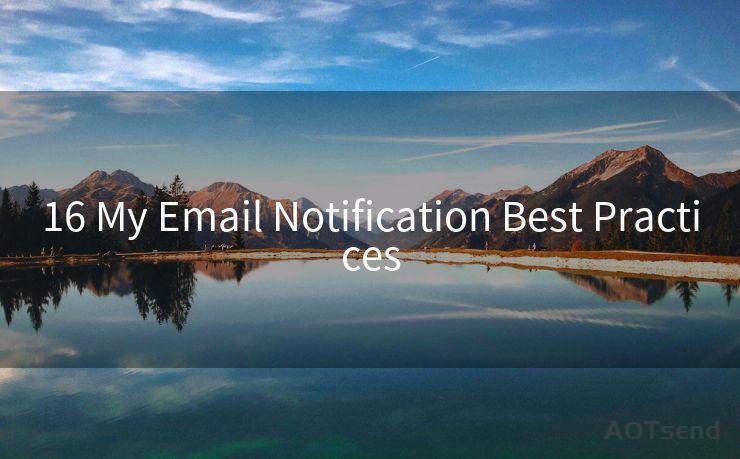16 My Email Notification Best Practices




Email notifications are a crucial part of any web or mobile application, keeping users engaged and informed. However, sending effective email notifications is an art that requires careful consideration. In this blog post, we'll explore 16 best practices for email notifications that will help you optimize your communication with users and improve their experience.
1. Clear and Concise Subject Lines
The subject line is the first thing users see when they receive an email. Make sure it's clear, concise, and gives a preview of the email's content. Avoid clickbait or vague subject lines that might mislead users.
2. Personalization
Use the recipient's name in the subject line or body of the email to create a more personal connection. Personalized emails have higher open and click-through rates.
3. Relevant Content
Ensure that the content of your email notification is relevant to the user. Segment your user base and send targeted emails based on their interests, preferences, or past behavior.
4. Timing Is Key
Consider the best time to send notifications. Avoid sending emails at inconvenient times, like the middle of the night, unless it's urgent.

5. Call to Action
Include a clear call to action (CTA) in your email. Whether it's to click a link, make a purchase, or update their profile, make sure the user knows what action they should take.
6. Unsubscribe Option
Always provide an unsubscribe option in your emails. This is not only a legal requirement but also helps maintain a healthy email list with engaged users.
7. Mobile-Friendly Design
Most users check their emails on mobile devices. Ensure that your email notifications are mobile-friendly and easy to read on smaller screens.
8. Test Before Sending
Always send yourself a test email to check for formatting, links, and overall readability before sending it to your entire list.
9. Avoid Spam Filters
Familiarize yourself with common spam trigger words and avoid using them in your subject lines or email body.
10. Frequency Matters
Don't bombard users with too many emails. Strike a balance between keeping users informed and not overwhelming them.
11. Use Plain Text and HTML Versions
Provide both plain text and HTML versions of your email notifications to ensure compatibility with different email clients.
12. Track and Analyze
Use email marketing tools to track open rates, click-through rates, and other metrics to optimize your email campaigns.
13. A/B Testing
Conduct A/B tests to see which subject lines, content, or CTAs work best with your audience.
14. Welcome Emails
Send a welcoming email to new subscribers introducing them to your service and setting expectations for future emails.
15. Re-Engagement Emails
For inactive users, send re-engagement emails with special offers or updates to lure them back.
16. Follow Email Marketing Best Practices
Stay up to date with the latest email marketing trends and best practices to ensure your emails are effective and compliant.
By following these 16 best practices for email notifications, you can improve user engagement, build trust, and drive conversions. Remember, email is still a powerful marketing tool, so use it wisely!




🔔🔔🔔
【AOTsend Email API】:AOTsend is a Managed Email Service for sending transactional emails. Support Email Types: reminders, authentication, confirmations, notifications, verification codes, invoices, password resets, account activations, billing statements, two-factor authentication (2FA), and one-time passwords (OTP) emails, etc. $0.28 per 1000 Emails. 99% Delivery, 98% Inbox Rate.
You might be interested in:
Why did we start the AOTsend project, Brand Story?
What is a Managed Email API, How it Works?
Best 25+ Email Marketing Platforms (Authority,Keywords&Traffic Comparison)
Best 24+ Email Marketing Service (Price, Pros&Cons Comparison)
Email APIs vs SMTP: How they Works, Any Difference?
Scan the QR code to access on your mobile device.
Copyright notice: This article is published by AotSend. Reproduction requires attribution.
Article Link:https://www.mailwot.com/p6965.html



